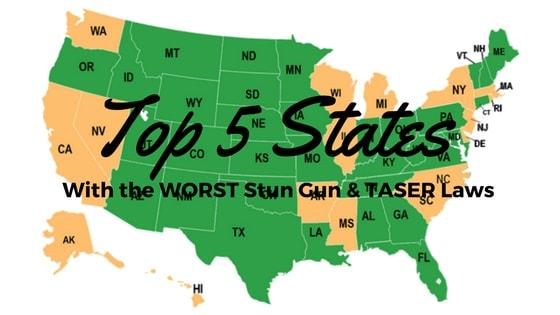Table of Contents
- Stun Gun Laws Across Different States Explained
- Understanding Restrictions and Permits for Stun Gun Ownership
- Key Factors to Consider Before Purchasing a Stun Gun
- Expert Recommendations for Safe and Legal Use of Stun Guns
- Concluding Remarks
Stun Gun Laws Across Different States Explained
Understanding the legal stance on stun guns can be complex, as regulations vary significantly from one state to another. While some states embrace the use of stun guns as a legitimate form of self-defense, placing minimal restrictions on ownership and carry, others enforce strict controls or outright bans. For instance, states like Texas and Florida generally allow possession with minimal regulation, whereas places like Hawaii prohibit stun guns completely. It’s essential to also note that many states require users to be of a certain age, typically 18 or older, and some mandate permits or background checks before acquiring one.
Here’s a quick breakdown of common regulatory themes you’ll encounter across various states:
- Permit Requirements: Some states require special permits or licenses for stun gun possession or carry, similar to firearms regulations.
- Usage Restrictions: There are states where stun guns are restricted to certain situations, such as self-defense at home, and cannot be carried in public spaces.
- Prohibited Locations: Federal properties, schools, and government buildings often have strict bans regardless of state laws.
- Age Limits: Most states enforce minimum age requirements, commonly set at 18 years old.
Understanding Restrictions and Permits for Stun Gun Ownership
While stun guns are considered effective self-defense tools, their legal status varies significantly across the United States. Many states allow ownership and carry of stun guns with few restrictions, but others impose stringent rules, including outright bans or specific permit requirements. It’s essential for potential owners to research their state and local laws thoroughly to avoid legal complications. Common restrictions may include limitations on where stun guns can be carried-such as schools, government buildings, or airports-and age requirements for possession.
Permits for stun gun ownership are not universally mandated, but where required, the process often involves background checks, proof of residency, and sometimes training certifications. Some jurisdictions tie stun gun permits to broader concealed weapons or self-defense licensing frameworks, while others treat them as separate entities. To navigate this complex landscape, prospective owners should consult official state websites or seek legal advice, ensuring compliance with all regulations. Below is a quick overview of typical considerations:
- States with total bans: A few states prohibit stun guns entirely, so ownership is illegal regardless of permits.
- Permit-required states: Users must apply for and obtain permits before legally carrying a stun gun.
- Permitted with restrictions: Stun guns may be owned but are subject to specific use or carry limitations.
- Open carry vs. concealed carry: Laws may differentiate between openly displaying a stun gun and carrying it discreetly.
Key Factors to Consider Before Purchasing a Stun Gun
Before making the decision to purchase a stun gun, it’s crucial to evaluate several important aspects to ensure your investment is both safe and effective. First, consider legal restrictions in your state or municipality. Laws regarding stun guns vary widely; some states impose strict regulations on possession, while others may require permits or outright bans. Research local laws thoroughly to avoid potential legal trouble. Additionally, assess your intended use-whether it’s for personal protection, law enforcement, or recreational purposes-as different models offer varying voltage levels, sizes, and features tailored to specific needs.
Another essential factor is the device’s quality and reliability. Opt for reputable brands with strong customer reviews and proven performance records. Key features to look for include:
- Durability and ergonomic design for ease of carrying and use.
- Battery life and charging methods to ensure readiness when needed.
- Safety mechanisms, such as activation switches or holster designs, to prevent accidental discharge.
- Additional features like built-in flashlights or alarms for enhanced personal safety.
By carefully weighing these factors, you’ll be better equipped to choose a stun gun that aligns with both your legal obligations and personal safety requirements.
Expert Recommendations for Safe and Legal Use of Stun Guns
When considering the use of stun guns, prioritizing safety and legality is crucial. Experts consistently advise users to thoroughly research state and local laws before purchasing or carrying a stun gun, as regulations can vary significantly. Beyond compliance, understanding how to handle the device properly ensures it serves as an effective tool for self-defense without causing unintended harm. Training sessions or instructional videos provided by reputable manufacturers are highly recommended to familiarize yourself with operating procedures, safe storage, and maintenance.
Key best practices for responsible stun gun use include:
- Always carry the stun gun concealed and securely to prevent accidental discharge or theft.
- Use the stun gun exclusively in situations of legitimate self-defense to avoid legal repercussions.
- Keep the device away from children and unauthorized users to prevent accidents.
- Regularly test and charge the stun gun to ensure it functions properly in emergencies.
- Stay updated on legal changes, as legislation can evolve and impact ownership rights.
Concluding Remarks
In conclusion, when it comes to stun gun legality across the U.S., it’s clear that the rules vary significantly from state to state. While many states allow possession and use with few restrictions, others have specific regulations or outright bans. Before considering purchasing or carrying a stun gun, it’s crucial to research your state and local laws thoroughly to ensure compliance and avoid legal issues. Staying informed not only helps protect your rights but also promotes responsible and safe use. Remember, knowledge is key when it comes to self-defense tools-so stay savvy and stay safe.Check Our Other Blogs
- StunGun – Your Trusted Source for Stun Guns, Laws, and Self-Defense Tips
- PepperSprayLaws – Your Trusted Resource for Pepper Spray Information
- StunGunLaws – Your Trusted Guide to Stun Gun Legality and Safety



